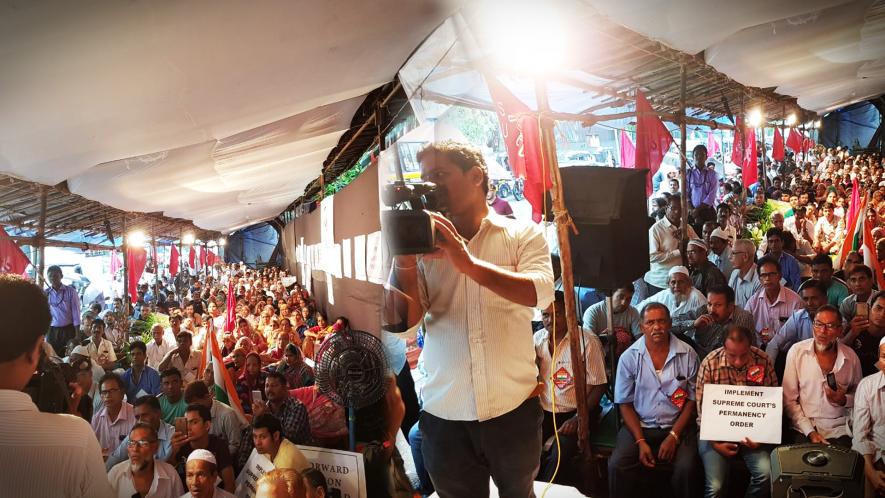Seafarers on Indefinite Hunger Strike at All Major Ports in India

Hundreds of seafarers started an indefinite hunger strike today at all major ports of the country to press for their long-standing demands. Seafarers (or seamen) run the ships that carry cargo to and from Indian ports. Also known as the merchant navy, this shipping system accounts for about 95% of foreign trade by volume and 68% by value. Over 1.5 lakh seafarers are employed in this strategic industry.
The hunger strike, organized by the Forward Seamens’ Union of India (FSUI), is being held in Mumbai, Kochi, Chennai, Kolkata, as also at all ports in Andaman, Goa, Gujarat, Andhra Pradesh, etc. Till last reports came in, 43 ships at sea also saw hunger strike by the seamen on board. The number of ships at sea where strike was observed is likely to go up as reports pour in from all corners of the world.
“The shipping ministry has only been giving false promises for many months. They have not done anything concrete. Our strike will continue till our demands are met. It is a life and death issue for the seafarers community,” said Naresh Birwadkar, general secretary of FSUI, speaking to Newsclick even as he sat on hunger strike.
“In the coming days, seamen’s families will also join the protests,” Birwadkar added.
The hunger strike’s first day coincided with the International Seafarers’ Day, celebrated globally each year on 25 June. Normally it is marked by sarkari functions in ports but this year, the seafarers have boycotted these functions and gone in for the hunger strike.
Also Read: The Seafarers Tale – Bloodied and Wounded By Shipping Line Sharks
One of the biggest issues facing seafarers is that of wages, as reported by NewsClick earlier. Govt. of India agreed to the International Labour Organisation’s Maritime Labour Convention and declared as much in a notification published in the Gazette Extraordinary on 29 February 2016. Section 9 (5) of the notification expressly states that “The wages included in the collective bargaining agreement or the Seafarers’ Employment Agreement shall be in accordance with the guidelines as laid down in the Maritime Labour Convention.” In a memorandum submitted to the Prime Minister by the Forward Seaman’s Union of India, on 21 November 2016, the seafarers urged that since the ILO’s Convention recommends a monthly basic wage of $614 (about Rs.41,500) govt. should ensure that they get it. Similar demands were reiterated many times including as recently as 30 May, in a letter to the Director General Shipping in the Ministry of Shipping.At present, seafarers get as little as Rs.7000 basic pay with additional allowances and ex gratia amounts that may vary.
A major issue facing the seafarers is that once they get back on home shore, they go on ‘leave’ and may not be re-employed till the ship line agrees to do so. Earlier, there used to be a Seamen Employment Office which had a roster system giving duties to seafarers by rotation. This was scrapped in 1994 and replaced by ship owners’ right to employ or not employ any seafarer. The striking workers are demanding that the SEO and the roster system be restarted.
Another major demand is for pension of Rs.5000 per month for all retired seafarers. Each retired (and registered) seafarer gets perhaps the lowest monthly pension in India’s organized sector – a paltry Rs.200! Seafarers allege that Rs.5000 crore is lying in various welfare funds but not being used for looking after the retired seafarers who are on the brink of destitution. Although provident fund facility is available to seafarers (albeit based on a very low basic wage), and they are covered by personal insurance while at sea, there is no provision for family’s medical insurance or coverage.
Other demands include working out a wage agreement, rolling back the current safe manning standards which have meant curtailment of minimum number of seamen on board by 12-14, and employment for trained seamen. At present there are many institutes that provide training to students for joining the merchant navy but hundreds of such trainees are currently roaming the streets unable to find jobs.
India’s shipping industry – especially the seafarers - have faced serious crisis since the 1990s as the govt. liberalized and deregulated the sector. Private shipowners have dominated the industry with the govt. slowly but surely adjusting to their needs and demands. Recently, changes were made to the shipping policy allowing more prominence to foreign owned shipping lines in cabotage (movement between Indian ports), as reported exclusively by Newsclick. Many of the demands raised by the seafarers in today’s hunger strike emanate from such policies favouring private lines.
Get the latest reports & analysis with people's perspective on Protests, movements & deep analytical videos, discussions of the current affairs in your Telegram app. Subscribe to NewsClick's Telegram channel & get Real-Time updates on stories, as they get published on our website.














